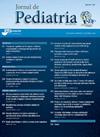Association of BMI and WC for insulin resistance and type 2 diabetes among Brazilian adolescents
IF 2.8
4区 医学
Q1 PEDIATRICS
引用次数: 0
Abstract
Objective
To investigate how body mass index (BMI) and waist circumference (WC) may be associated with insulin resistance and type 2 diabetes (T2DM) in Brazilian adolescents.
Methods
Cross-sectional study using data from the Brazilian Study of Cardiovascular Risks in Adolescents (ERICA) including adolescents aged 12–17 years. The relationship between adiposity and T2DM was investigated using ordinal logistic regression models. To study the association between adiposity categories and the occurrence of insulin resistance, linear regression models were used.
Results
The prevalence of T2DM for the same BMI category did not increase with the presence of high WC. Regarding insulin resistance, for the same BMI categories, having a high WC resulted in a higher prevalence of insulin resistance (HOMA-IR). The only groups significantly associated with prediabetes and T2DM were those with obesity by BMI with elevated WC (POR 1.68, 95 % CI 1.45; 1.94) and obesity with normal WC (POR 1.58, 95 % CI 1.01; 2.46). Similar findings were observed concerning insulin resistance, where the increased WC had its greatest effect when associated with obesity by BMI (β Coefficient 2.20, 95 % CI 1.89; 2.50).
Conclusion
The combination of BMI and WC is better for assessing adolescents at risk of developing T2DM.
巴西青少年的 BMI 和 WC 与胰岛素抵抗和 2 型糖尿病的关系。
目的研究巴西青少年的体重指数(BMI)和腰围(WC)与胰岛素抵抗和 2 型糖尿病(T2DM)之间的关系:使用巴西青少年心血管风险研究(ERICA)的数据进行横断面研究,研究对象包括 12-17 岁的青少年。采用序数逻辑回归模型研究了肥胖与 T2DM 之间的关系。为了研究肥胖类别与胰岛素抵抗发生率之间的关系,采用了线性回归模型:结果:在同一体重指数类别中,T2DM 的患病率并没有随着高 WC 的存在而增加。在胰岛素抵抗方面,对于相同的体重指数类别,高腹围会导致更高的胰岛素抵抗发生率(HOMA-IR)。唯一与糖尿病前期和 T2DM 有明显相关性的组别是那些体重指数(BMI)为肥胖且腹围升高的组别(POR 1.68,95 % CI 1.45; 1.94)和腹围正常的肥胖组别(POR 1.58,95 % CI 1.01; 2.46)。在胰岛素抵抗方面也观察到类似的结果,当体重指数(BMI)与肥胖相关时,WC 的增加影响最大(β 系数 2.20,95 % CI 1.89;2.50):结论:结合体重指数和腹围来评估青少年患 T2DM 的风险更好。
本文章由计算机程序翻译,如有差异,请以英文原文为准。
求助全文
约1分钟内获得全文
求助全文
来源期刊

Jornal de pediatria
医学-小儿科
CiteScore
5.60
自引率
3.00%
发文量
93
审稿时长
43 days
期刊介绍:
Jornal de Pediatria is a bimonthly publication of the Brazilian Society of Pediatrics (Sociedade Brasileira de Pediatria, SBP). It has been published without interruption since 1934. Jornal de Pediatria publishes original articles and review articles covering various areas in the field of pediatrics. By publishing relevant scientific contributions, Jornal de Pediatria aims at improving the standards of pediatrics and of the healthcare provided for children and adolescents in general, as well to foster debate about health.
 求助内容:
求助内容: 应助结果提醒方式:
应助结果提醒方式:


